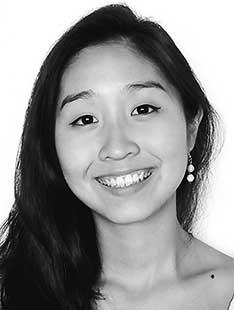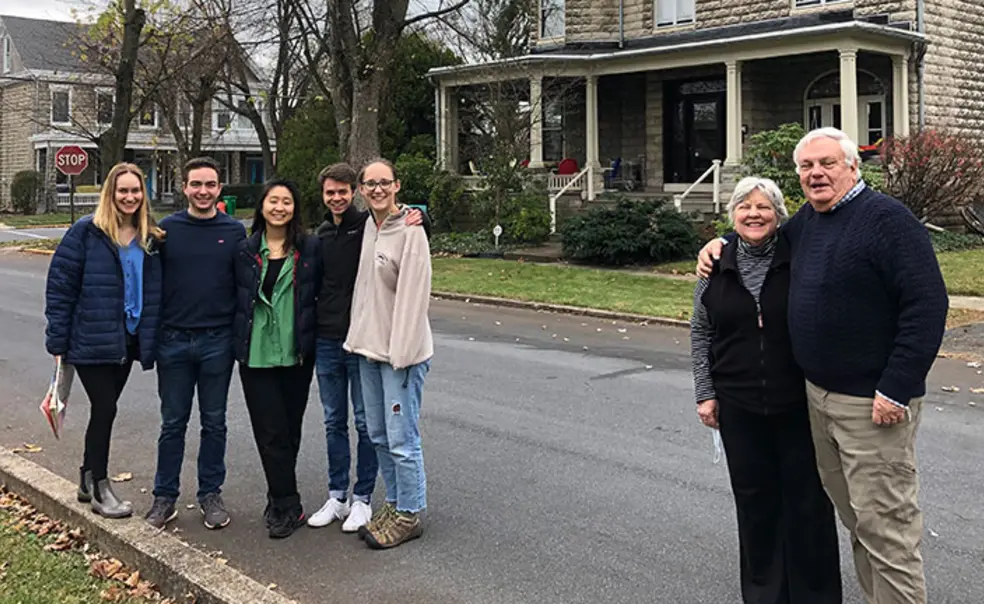Students Scattered by COVID Connect With Alumni Across the Country
‘How often do you have five Princeton seniors on your doorstep offering cookies?’

Then we met the Princetonian living across the street.
When Bob Cavenagh ’65 and his wife, Susan, opened their front door to four students holding a plate of pumpkin cookies in early November, nobody knew of our most salient connection. It only took a few questions for obliviousness to become incredulity, which soon become neighborly exchanges of bread, recipes, and stories of the school that tied us together in the first place.
“How often do you have five Princeton seniors on your doorstep offering cookies?” Bob asked me, weeks after we’d first met, as we sat by the heater on his back porch.
When undergraduates are on campus for a normal academic year, not often at all. But by scattering students across the nation, the pandemic has unexpectedly created multigenerational connections outside the usual crossroads of Reunions and career searches.
When Julia Ilhardt ’21, a Chicago-area native and SPIA concentrator, called a potential Airbnb host to inquire about a home in Chapel Hill, North Carolina, she explained she and her four housemates — also Princeton seniors — were not partiers, contrary to the collegiate stereotype, but rather “seniors just trying to write our theses.”
“I get that,” replied the host, who knew what the experience was like — because Anne Gordon ’01 had also once written a senior thesis, as had her partner, Andrew Garland ’01.
“As soon as they found out that we were Princeton students, they were really excited,” said Ilhardt, who has spent the semester with a Princeton sticker above her headboard. Although she and her housemates have yet to meet Gordon and Garland in person, Princeton trinkets around the house — like mugs and a book about the Nassoons — remind them of the home they share, 500 miles away.
Meanwhile in Princeton, Ethan Seide ’22, an ORFE major from Bethesda, Maryland, has been living with another Princetonian as one would during a regular year — albeit one who graduated 50 years before Seide will.
Seide and his host, Fritz Cammerzell ’72, have known each other since Seide’s Pre-rade. When it was clear that most undergrads wouldn’t be living on campus in the fall, Cammerzell — with whom Seide has kept in touch since his freshman year — offered to host the junior in his Princeton home, where Seide has since developed a friendship with Cammerzell’s 18-year-old son, Henry, and has enjoyed weekly dinners in town with his host.
“He keeps me involved in what’s going on,” said Cammerzell of Seide, who in turn believes the pandemic has made the two “a lot closer” — “I really see Fritz as more of a friend rather than a Princeton alum,” Seide added.
I know what he means. It’s been great to learn about Princeton-specific traditions, especially those that are familiar in concept but foreign in practice, like typewritten theses. And of course, there are other things we can’t imagine, like Princeton without women, or, as our Carlisle neighbors Bob and Susan experienced in 1965, a wedding in January of Bob’s senior year.
But what will remain with us, beyond the fun anecdotes, is a friendship that was born from a semester in which we believed friendships — particularly with other Princetonians — would be hard to come by.
As our time in Carlisle comes to a close and we anticipate a spring back on campus, I’m sure that my conversations with Bob and Susan won’t be the last. Perhaps we’ll see them at Reunions. Maybe my housemates and I will visit them in Carlisle. Or perhaps we can expect serendipity to play its part: If there’s anything this semester has proven, it’s that coincidences can be found in all kinds of places.










No responses yet